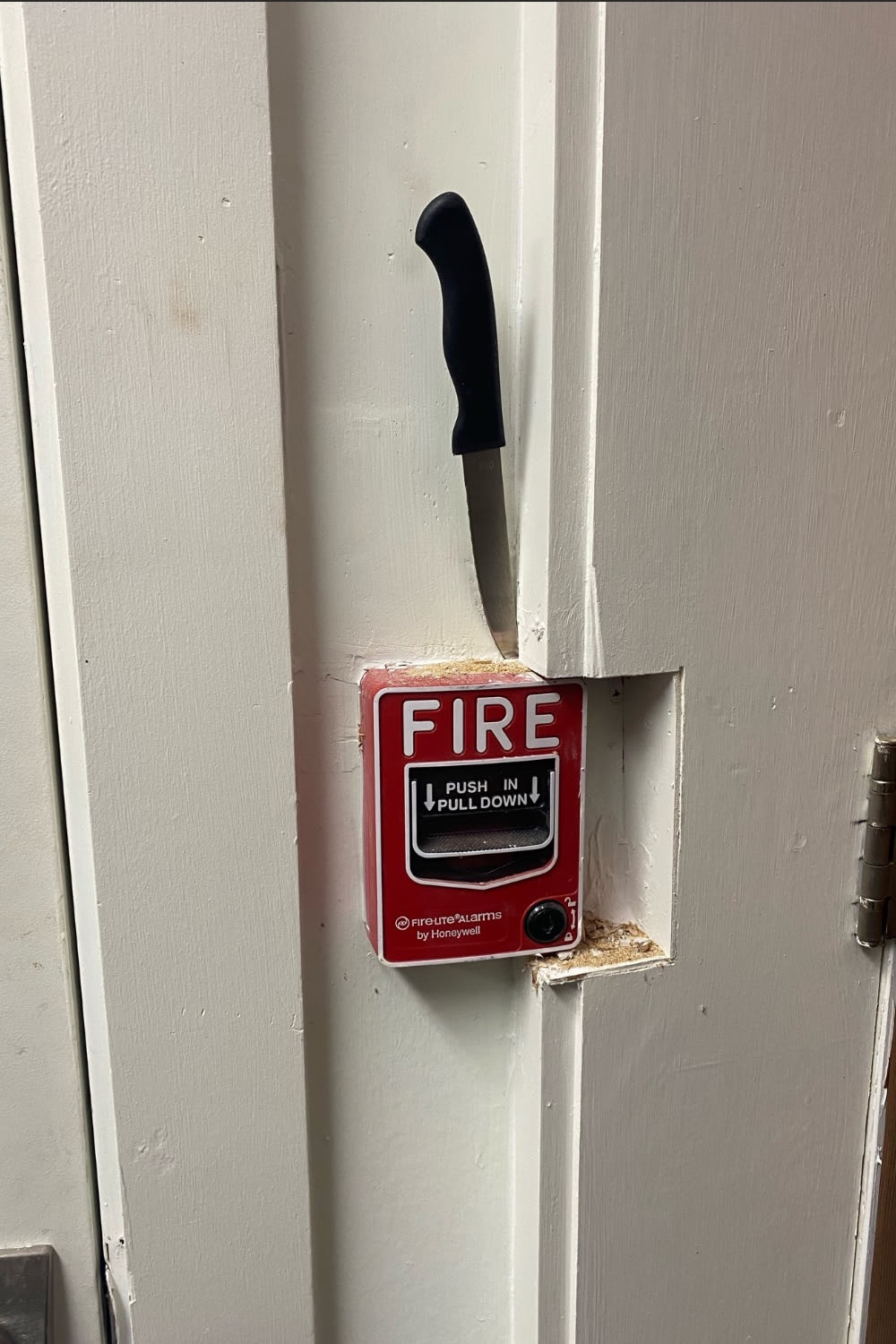At thousands of apartment units across the country, tenants have handed their home lives to yet another buzzy venture-backed startup. Common Living, which has raised more than $100 million to create communal living spaces across America, is trying to succeed where WeWork founder Adam Neumann failed.
Considering that influx of cash, how are things going?
“It’s been probably one of the worst experiences living somewhere I’ve ever had in my 38 years on this planet,” a tenant named Will Oliver told The Daily Beast just before moving out last month. “People always have slight grumbles with their landlord… But I think this goes beyond the pale.” He likened the living arrangement to a “nightmare.”
Among the complaints from 15 current and former tenants who spoke to The Daily Beast: uncleaned vomit, sparring roommates, abysmal corporate communication, endless maintenance delays, and lax security that has allowed strangers to enter and sleep in communal areas.
Reached for comment, a company spokesperson said, “Like any other property manager, we take every step to fix the situations we can control in our buildings but we can not regulate the interpersonal behaviors between our residents…We take every precaution we can to ensure the best living experiences possible.”

A former resident of a Common in D.C. said occupants removed a knife block from the common area because they were afraid a stranger might break in and “confront a resident.”
Provided to The Daily Beast
Common was founded in 2015 with the goal of making it easier to find roommates by recreating the collegiate “co-living” dynamic for adults. Prospective tenants move into their own room in a suite but share common areas, a kitchen, and—depending on the unit—a bathroom with the other residents.
The company acts as a management firm for landlords, implementing its model in buildings it doesn’t own. Its portfolio has approximately doubled since 2020 to 7,000 units under management, roughly half of which are co-living spaces, founder and CEO Brad Hargreaves told The Daily Beast in February.
“We really want to make the experience of renting better,” he said.
But Common’s rapid growth hasn’t been smooth, many of the residents said, another example of a startup disrupting a staid industry and achieving a nine-figure valuation perhaps at the expense of some parties impacted by its work.
WeWork’s mercurial founder Adam Neumann famously tried a similar “co-living” play, WeLive, though it eventually shuttered after he self-imploded and exited the firm in 2019.
Some residents interviewed for this story said there were elements of Common’s buildings they enjoyed, particularly the communal atmosphere and the ability to find accommodations on relatively short notice.
Yet almost all of them related anecdotes of egregiously poor communication—or worse.
“You had to fend for yourself,” said Brianna Finoli, who until January lived in one of Common’s Washington, D.C. buildings.
“The incompetence level is just a level I’ve never experienced with a company before.”
Several residents at Common’s Oakland location recalled how another occupant declared himself a “potential mass murderer” in a company messaging app in December. “I want to block the emergency exits and I want to set a fire and watch you all burn and hear you all scream in agony,” he wrote in one message, a screenshot of which The Daily Beast obtained.
The tenants alleged that they had complained about the man’s unstable behavior for months.
After the threats, one recent resident said, a company employee simply brushed off the messages. “Oh yeah, he does that sometimes,” she recalled the worker saying.
The resident said she demanded that Common let her move to a different property, but despite the safety concerns, she alleged, the company attempted to charge her a transfer fee.
“I was like, ‘You’re kidding me, right? This guy literally said that he’s going to [set] us all on fire.’”
The police ultimately got involved, and the man no longer lives in the building. Still, the tenants claimed, Common did little to communicate how the situation was being addressed and whether the company could guarantee their safety going forward.
Asked about the incident, Hargreaves declined to comment on the situation—or any other specific anecdotes—but he outlined his view on conflict resolution.

“You had to fend for yourself,” said a former resident of Common’s Washington, D.C. buildings.
Provided to The Daily Beast
“Philosophically, we’re not the parents, we’re not an R.A.,” he said. “We have to ensure that laws are being followed, that the environment is safe and it’s welcoming. But we’re not going to enforce a curfew, for example… These are adults.”
Even using that standard, multiple current and former tenants said, the company has sometimes failed dramatically.
Hargreaves knows how to lucratively scale a business. In 2010, at 23 years old, the Yale grad co-founded the technology bootcamp General Assembly, which was reportedly acquired by a Swiss firm for more than $400 million in 2018.
Three years before that, Hargreaves launched Common, inspired by his own experience using Craigslist to score an apartment in New York City. “I had two weeks to find a place to live,” he recalled.
At the outset, Common focused exclusively on the co-living model, which offers tenants a furnished unit in a shared space, with internet and utilities included in the rental price.
Hargreaves said that Common’s average co-living unit is 25 to 30 percent cheaper than a studio apartment, once you account for utilities, cleaning costs, and basic kitchen and bathroom supplies.
Some tenants have found the concept appealing. Athens Garrotte, who until recently lived in a unit managed by Common in New York City’s Long Island City neighborhood, said she enjoyed her experience and that it aligned with her expectations prior to moving in.
A separate tenant who was provided by the company for an interview, Reuben Riley, lauded his building’s communal atmosphere, though he lived in one of Common’s roommate-free units.
Other residents were far less complimentary. Among the most common grievances: tenants who want to report an issue have to submit an electronic request, and they sometimes wait weeks or months to hear back—if they hear back at all.
“You had to fend for yourself.”
A number of them said they resorted to calling a phone line intended for emergencies or to flagging issues on Common’s social media pages in the hopes that the reputational risk would elicit a faster response.
One New York City tenant, who was also provided by Common for an interview, acknowledged that frustration, saying, “We have to really advocate for ourselves in order to get certain things fixed.” (A spokesperson for Common said that its “support team’s average response rate to member issues is 1.5 hours for emailed cases, and our emergency phone line answer rate is 90 percent.”)
Some residents complained that they expected the company to be more hands-on in its approach to management. In one instance, a tenant recalled, she felt unsafe after another occupant accosted her and called her “a fucking bitch” when she asked him to clean his dishes. “They did nothing about it,” she said.

Residents at a Common in Oakland say the location can make for unusual encounters.
Provided to The Daily Beast
Hargreaves said Common has doubled the size of its support team in recent months, and he argued that confrontations are rising because more tenants are working from home. “That creates, obviously, a new set of challenges,” he said. “Things get dirtier faster, shared supplies disappear faster. So we’ve certainly had to adjust and update our model.”
As for interpersonal issues, he said that Common conducts a background check on tenants but intentionally doesn’t intensively match roommates based on personality. That, he argued, might raise fair housing concerns. And unhappy tenants, he said, can always transfer.
Yet even that explanation doesn’t address other lapses.
Multiple tenants said they were sometimes never alerted when new tenants moved in, so strangers would arrive unannounced.
And three residents at a Common in D.C. said the company repeatedly failed to secure a broken door and address other safety lapses in their building, allowing a man recently to break in wielding a knife. When discussing the security issue and other deficiencies with a company representative, one tenant recalled, “her response was, ‘What would you have us do about it?’ It was like, fuck you. First of all, that’s not my job. Like, it’s your job.”
“The incompetence level is just a level I’ve never experienced with a company before,” said tenant Natalie Strauber.
Will Oliver, who moved out in April, said occupants in the building removed a knife block from the common area because they were afraid a stranger might break in and “confront a resident.” Frustrated by Common’s failure to remedy problems, he said, he began interrupting apartment tours and warning would-be renters about the property. At least one resident also sent complaints to city inspectors. (A security company has since been hired.)
“I was like, ‘You’re kidding me, right? This guy literally said that he’s going to [set] us all on fire.’”
Some tenants also complained about Common’s billing practices. Another current lessee, Yara Gayar, said she signed a contract with Common to live at one of its D.C. buildings earlier this year. Two days before her scheduled move-in, she received an email notifying her that there had been a “system error” and that her assigned room was still occupied, she said. If she wanted a different unit in the building, a company official said the following day, she would need to cough up an extra $200 per month.
Gayar grew upset with the employee, who promised to circle back on the matter.
The next morning, Gayar said, she showed up to her new building at the assigned time but couldn’t get inside. She eventually received a call from a Common employee who told her that she wouldn’t be allowed in unless she agreed to a new contract at a higher rate. “This is how I would define extortion,” she recalled.
Gayar said she asked about whether the company planned to leave her “on the street unless I sign this contract.” The answer, in effect, was yes.
According to Gayar, she verbally agreed to the higher rent price under duress, then spent weeks fighting with Common to honor the initial contract, since it had been their error to begin with. Company officials repeatedly shot her down, she said. In one email reviewed by The Daily Beast, a Common worker accused her of “squatting.”
“We will be proceeding with an eviction unless the lease is signed today,” the employee wrote.
Left with no alternative, Gayar contacted Hargreaves directly, and eventually he stepped in and resolved the issue last month. She remains upset about the ordeal.
The Common in Oakland is situated above a charter school, which can make for unusual encounters, like when high-school students sneak through the unlocked doors to vape in the bathroom, according to one recent tenant.
Until last summer, the residences were managed by a company called Starcity, whose assets Common acquired in June.
“It really, really went downhill fast from there,” said former tenant Nnenna Umelloh.
Umelloh said she grew frustrated by maggots in the garbage receptacles and black mold in one of the bathrooms. Recently, one occupant recalled, one of the showers backed up with sewage and it began “raining down in our kitchen.”
One resident said she didn’t personally hold Common responsible for these issues. Another recalled things differently, noting that she had repeatedly reached out to Common to complain about messiness in the kitchen. The response: “You should work it out amongst yourselves.”
The tenant said she received a follow-up email asking her to rate her customer service encounter. She rated it a “thumbs down,” then was told the situation would be escalated to the appropriate party. It simply went back to the same customer service representative, she said.
Umelloh, who moved out in October, has not gotten over her experience with the company. “Common as an organization, they were not responsive, they did not care about our wellbeing… They just simply did not care.”
Credit: Source link




















